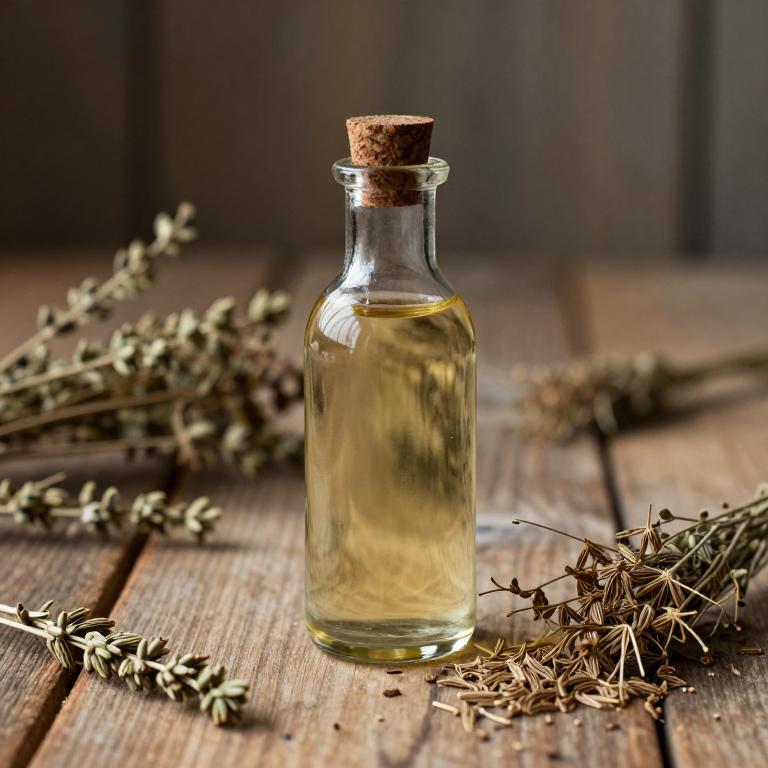10 Best Herbal Syrups For Upset Stomach

Herbal syrups for upset stomach are natural remedies that often contain ingredients like ginger, peppermint, fennel, and licorice root, which are known for their soothing and anti-inflammatory properties.
These syrups are typically easy to swallow and can be particularly beneficial for children or individuals who have difficulty taking pills. They work by calming the digestive system, reducing nausea, and easing cramping associated with indigestion or mild gastrointestinal discomfort. Many herbal syrups are available over-the-counter and are generally considered safe when used as directed, though it's advisable to consult a healthcare provider if symptoms persist or worsen.
Overall, they offer a gentle and effective alternative for managing mild stomach upset without the use of harsh chemicals.
Table of Contents
- 1. Cumin (Cuminum cyminum)
- 2. Fennel (Foeniculum vulgare)
- 3. Ginger (Zingiber officinale)
- 4. Peppermint (Mentha piperita)
- 5. Licorice (Glycyrrhiza glabra)
- 6. Turmeric (Curcuma longa)
- 7. English lavender (Lavandula angustifolia)
- 8. Dog rose (Rosa canina)
- 9. Love-in-a-mist (Peucedanum ostruthium)
- 10. Black pepper (Piper nigrum)
1. Cumin (Cuminum cyminum)

Cuminum cyminum, commonly known as cumin, is often used in herbal syrups to alleviate symptoms of an upset stomach due to its carminative and digestive properties.
These syrups are typically prepared by infusing cumin seeds in a base of honey or glycerin, which helps preserve the essential oils and active compounds. The aromatic compounds in cumin, such as limonene and cineole, may help reduce bloating, gas, and discomfort by stimulating digestion and relaxing the gastrointestinal tract. Herbal syrups containing cumin are often preferred for their mild, soothing flavor and ease of consumption, especially for children or individuals who cannot take strong-tasting medications.
While they may provide relief for mild digestive issues, it is important to consult a healthcare professional for persistent or severe stomach problems.
2. Fennel (Foeniculum vulgare)

Foeniculum vulgare, commonly known as fennel, has been traditionally used in herbal syrups to alleviate symptoms of an upset stomach.
The essential oils in fennel, particularly anethol, possess mild antispasmodic and carminative properties that help relax the gastrointestinal tract and reduce gas and bloating. These syrups are often used to soothe digestive discomfort, such as indigestion, cramping, and nausea. Due to its gentle nature, fennel syrup is considered safe for both adults and children when used in appropriate doses.
However, it is advisable to consult a healthcare professional before use, especially for individuals with chronic digestive issues or those taking other medications.
3. Ginger (Zingiber officinale)

Zingiber officinale, commonly known as ginger, has long been used in traditional medicine for its digestive benefits, and ginger herbal syrups are a popular remedy for upset stomachs.
These syrups contain concentrated ginger extract, which is known to soothe nausea, reduce inflammation, and aid in digestion due to its active compounds like gingerol and shogaol. The soothing properties of ginger can help alleviate symptoms such as bloating, indigestion, and motion sickness when consumed in appropriate doses. Many commercially available ginger syrups are made with natural ingredients and are often recommended for use during pregnancy or by individuals with sensitive stomachs.
However, it is important to consult a healthcare professional before using ginger syrups, especially for prolonged periods or in combination with other medications.
4. Peppermint (Mentha piperita)

Mentha piperita, commonly known as peppermint, is widely used in herbal syrups to alleviate symptoms of an upset stomach.
The active compounds in peppermint, such as menthol and methylated oils, help soothe the gastrointestinal tract by relaxing the muscles and reducing spasms. These syrups are often recommended for individuals experiencing bloating, gas, or nausea due to their calming effects on the digestive system. Peppermint herbal syrup is typically taken in small doses, usually before meals, to maximize its soothing properties.
It is important to consult with a healthcare provider before use, especially for those with certain medical conditions or who are taking other medications.
5. Licorice (Glycyrrhiza glabra)

Glycyrrhiza glabra, commonly known as licorice root, has been traditionally used for its soothing properties, making it a popular ingredient in herbal syrups for upset stomach.
The syrup contains glycyrrhizin, a compound that helps reduce inflammation and irritation in the gastrointestinal tract. It is often used to alleviate symptoms such as heartburn, indigestion, and nausea. However, long-term use of licorice root syrup may lead to side effects like high blood pressure due to its effect on sodium and potassium levels.
As a result, it is recommended to consult a healthcare professional before using licorice-based syrups, especially for prolonged periods or in individuals with existing health conditions.
6. Turmeric (Curcuma longa)

Curcuma longa, commonly known as turmeric, has been widely used in traditional medicine for its anti-inflammatory and digestive properties.
When formulated into a herbal syrup, curcuma longa can help alleviate symptoms of an upset stomach by soothing the gastrointestinal tract and reducing inflammation. The active compound, curcumin, is known for its ability to support digestion and may help relieve bloating, nausea, and indigestion. This natural remedy is often preferred for its mild side effects compared to conventional medications.
However, it is advisable to consult a healthcare professional before using curcuma longa syrup, especially for prolonged or severe digestive issues.
7. English lavender (Lavandula angustifolia)

Lavandula angustifolia, commonly known as English lavender, has been traditionally used for its calming and soothing properties, and its essential oils and herbal syrups are increasingly being recognized for their potential to alleviate symptoms of an upset stomach.
The calming effects of lavender can help reduce gastrointestinal spasms and promote relaxation, which may ease discomfort associated with indigestion or nausea. Herbal syrups made from lavender often contain other complementary ingredients like ginger or peppermint, which further support digestion and soothe the stomach lining. These syrups are typically safe for most adults and can be a gentle alternative to over-the-counter medications for mild digestive issues.
However, it is advisable to consult a healthcare professional before use, especially for individuals with chronic conditions or those taking other medications.
8. Dog rose (Rosa canina)

Rosa canina, also known as dog rose, is a traditional herbal remedy commonly used in the form of a syrup to support digestive health.
This herbal syrup is made from the dried berries of the Rosa canina plant, which are rich in vitamins, antioxidants, and bioflavonoids. It is often recommended for its soothing properties, which can help alleviate symptoms of an upset stomach, such as bloating and indigestion. The gentle nature of Rosa canina syrup makes it a popular choice for both adults and children.
When taken as directed, it may help promote a healthier digestive system and reduce discomfort associated with mild gastrointestinal issues.
9. Love-in-a-mist (Peucedanum ostruthium)

Peucedanum ostruthium, also known as bishop's weed, has been traditionally used in herbal medicine for its potential soothing effects on the digestive system.
Herbal syrups made from this plant may help alleviate symptoms of an upset stomach by reducing inflammation and promoting digestion. The active compounds in Peucedanum ostruthium, such as volatile oils and flavonoids, are believed to have carminative and antispasmodic properties. These syrups are often prepared with other calming herbs to enhance their effectiveness.
While generally considered safe when used as directed, it is important to consult a healthcare professional before using Peucedanum ostruthium, especially for prolonged periods or in combination with other medications.
10. Black pepper (Piper nigrum)

Piper nigrum, commonly known as black pepper, is often used in herbal syrups to alleviate symptoms of an upset stomach.
The active compound in black pepper, piperine, may enhance digestion and reduce gastrointestinal discomfort by stimulating digestive enzymes. These herbal syrups are typically made by combining ground black pepper with honey or other natural sweeteners to improve taste and solubility. While they are generally considered safe for most people, individuals with sensitive stomachs should use them with caution.
Piper nigrum herbal syrups can be a natural alternative to conventional remedies for mild digestive issues.